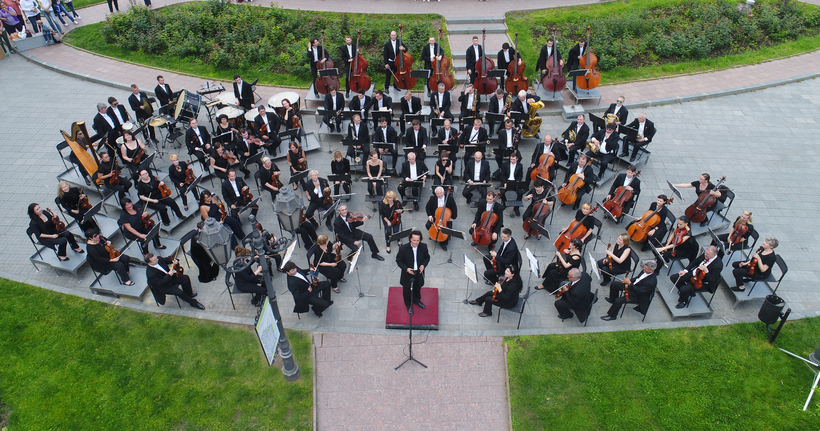It was March 22, 2014, days after Russia annexed Crimea. In the packed market of Odessa, fishwives were scraping their catch, beekeepers were guarding their honey, shoppers were shopping for dinner. Casually, a bass player strolled into the crowd, then a bassoonist, a trumpeter, a timpanist. Scattered here and there, they began, discreetly, to play. But it wasn’t long before the music exploded into—what else?—Beethoven’s “Ode to Joy,” soon joined by a chorus in full cry. In the eye of the tempest, arms waving, locks flying, stood Hobart Earle, the Odessa Philharmonic’s Venezuelan-born American music director, caller of the flash mob. (Want to see? Google “Odessa,” “Market,” “Beethoven” for a YouTube link.)
Jump cut to Tuesday, September 6, 2022, when Hobart and his forces demonstrate their humanitarian fighting spirit in the more formal surroundings of Berlin’s revered Philharmonie. The program—a late addition to the illustrious, otherwise all-Western lineup of top international orchestras at the season-opening Musikfest Berlin—begins with music of Myroslav Skoryk, Mykola Lysenko, and Alemdar Karamanov, revered Ukrainian composers little known abroad. Then comes the 45-minute second symphony of Finland’s Jean Sibelius. This was the music the composer’s compatriots, then under the yoke of Russia, embraced from its first performance as their “Symphony of Independence.” After streaming live, the Odessa Philharmonic’s Berlin performance remains available on demand through September 17.
Earle still can hardly believe this is happening. “The entire operation,” he said recently, “the invitation to such a major festival in Berlin, along with all the logistics of assembling the orchestra in wartime, seems like some kind of miracle.” If so, it’s the kind of miracle that comes only to the deserving.
Like many another arts capital in the Eastern Bloc, Ukraine’s “Pearl of the Black Sea” is way off most Western music lovers’ radar. Yet its traditions run deep. The violinists Nathan Milstein and David Oistrakh are among the 20th-century titans to have emerged from Odessa, as are the pianists Emil Gilels and Sviatoslav Richter. And just look at Philharmonic Hall, completed in 1899, a palazzo for music inspired by the Doge’s in Venice, housing an ornate, all-but-Byzantine auditorium of sumptuous grandeur.
At home, the Odessa Philharmonic remains a crown jewel. On the international scene, it’s the first Ukrainian orchestra to have crossed both the Atlantic and the Equator, picking up sheaves of rave reviews along the way. Yet its tours have been too infrequent, its discography too little promoted to compete for attention with the brand names that dominate Western markets.
Even so, Gramophone Magazine has had this to say about the Odessa Philharmonic on Maestro Earle’s watch: “Who could have foreseen that this once prosperous center of commerce and now impoverished provincial backwater of the former Soviet Union would, within a period of a couple of years or so, produce an orchestra capable of making music of such sustained eloquence and personable character? Critics the world over, from Vienna to New York to Moscow, clearly know a good thing when they hear it.”
Under fire, such excellence takes on a whole new meaning.
The Musikfest Berlin concert of the Odessa Philharmonic streams on demand on the Berliner Festspiele Music Library from September 7 to 17
Matthew Gurewitsch writes about opera and classical music for AIR MAIL. He lives in Hawaii

